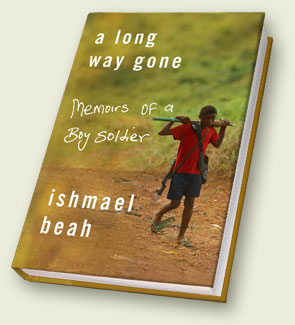
This week I read Ishmael Beah's book A Long Way Gone: Memoirs of a Boy Soldier. I really recommend it; it is hard to read, but I think the international community owes it to Beah to read this book, get sensitized, and then get passionate and angry about the fact that children are being used as soldiers in numerous conflicts around the world.
This book provides an up-close look at the plight of child soldiers in the civil war in Sierra Leone (which ended in 2002). The conditions described can probably be generalized to many other child soldiers as well. In the 1990s, Sierra Leone was embroiled in a brutal civil war that resulted in the deaths of tens of thousands of people, and displaced more than one-third of the country's population. Both government forces and armed rebel groups recruited and forcibly conscripted children into their armed forces. (This practice continues in a number of ongoing conflicts today--see here, here and here for examples.)
When Beah was thirteen years old, he was conscripted into the national army, and went through "training" to become a soldier. Aside from the training in weapons, the children received a steady diet of drugs and Rambo movies (something that makes me feel really ashamed of Hollywood), and then they were thrust into combat and instructed to kill "anything that moved." Symptoms of post-traumatic stress were treated with cocaine and marijuana. For several years, Beah traveled with the army, attacking villages and rebel camps, and killing people in brutal ways. I can't imagine how painful it must have been for Beah to revisit these events in order to write the book. He doesn't flinch. He tells the truth.
At age 16, Beah was removed from the army by UNICEF and placed in a rehabilitation center. After a challenging rehabilitative period, Beah's path took him to testify before the United Nations, meet with international conferences of youth, and ultimately live in the U.S. and attend college here. It's clear, reading the book, that Beah is a naturally gentle and forgiving spirit, and one of the messages of the book is that under certain circumstances, all people are capable of great acts of brutality. Also, under certain circumstances, we are all capable of reclaiming our humanity.
In the end, A Long Way Gone is a harrowing look at the horrific treatment of children involved in conflict situations --and a graphic and heartbreaking look at war in general-- but it is also a story about hope and the power of rehabilitation. In Beah's words, from an occasion when he spoke before the UN Economic and Social Council: "I have been rehabilitated now, so don't be afraid of me. I am not a soldier anymore; I am a child. We are all brothers and sisters. What I have learned from my experiences is that revenge is not good... If I am going to take revenge, in that process I will kill another person whose family will want revenge; then revenge and revenge and revenge will never come to an end."
You can read more about Beah and the book on his website. I was also interested to read the perspective of the New York Times book review.






No comments:
Post a Comment